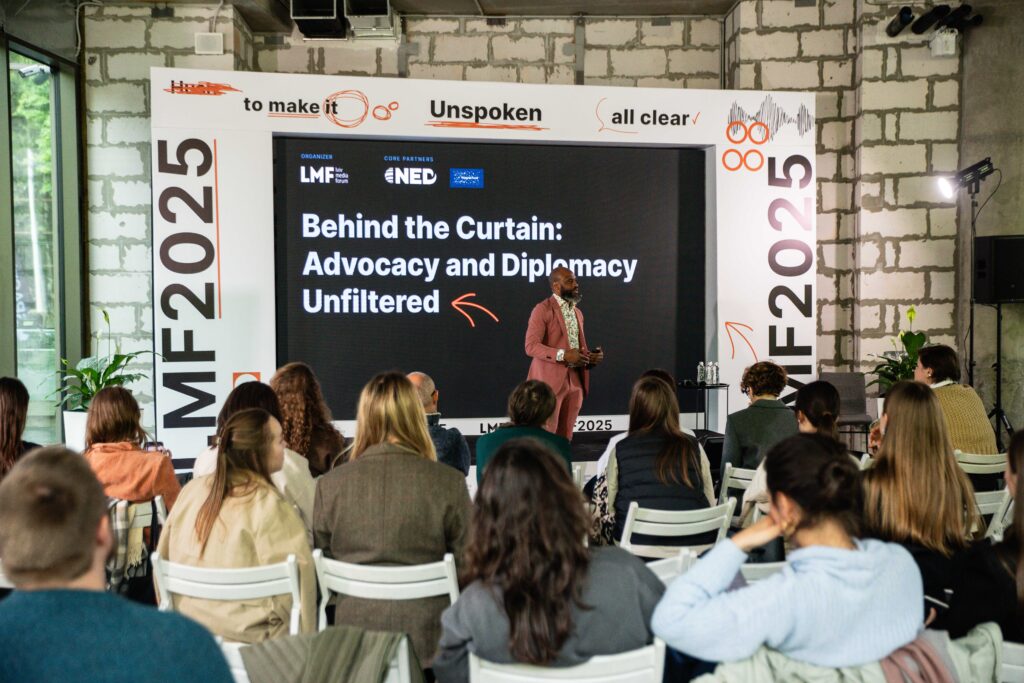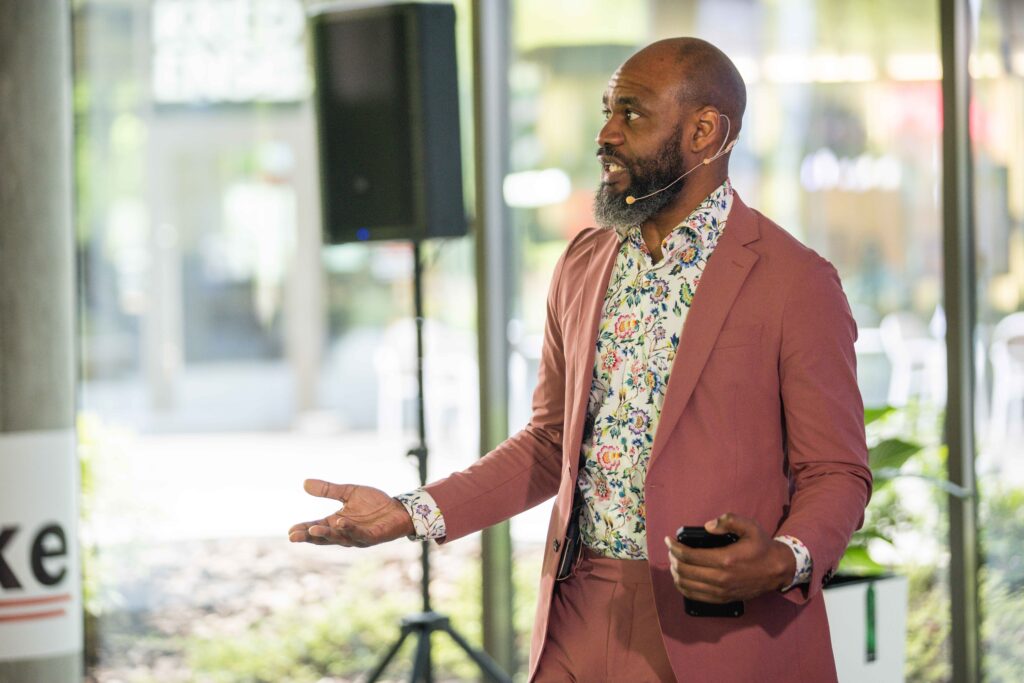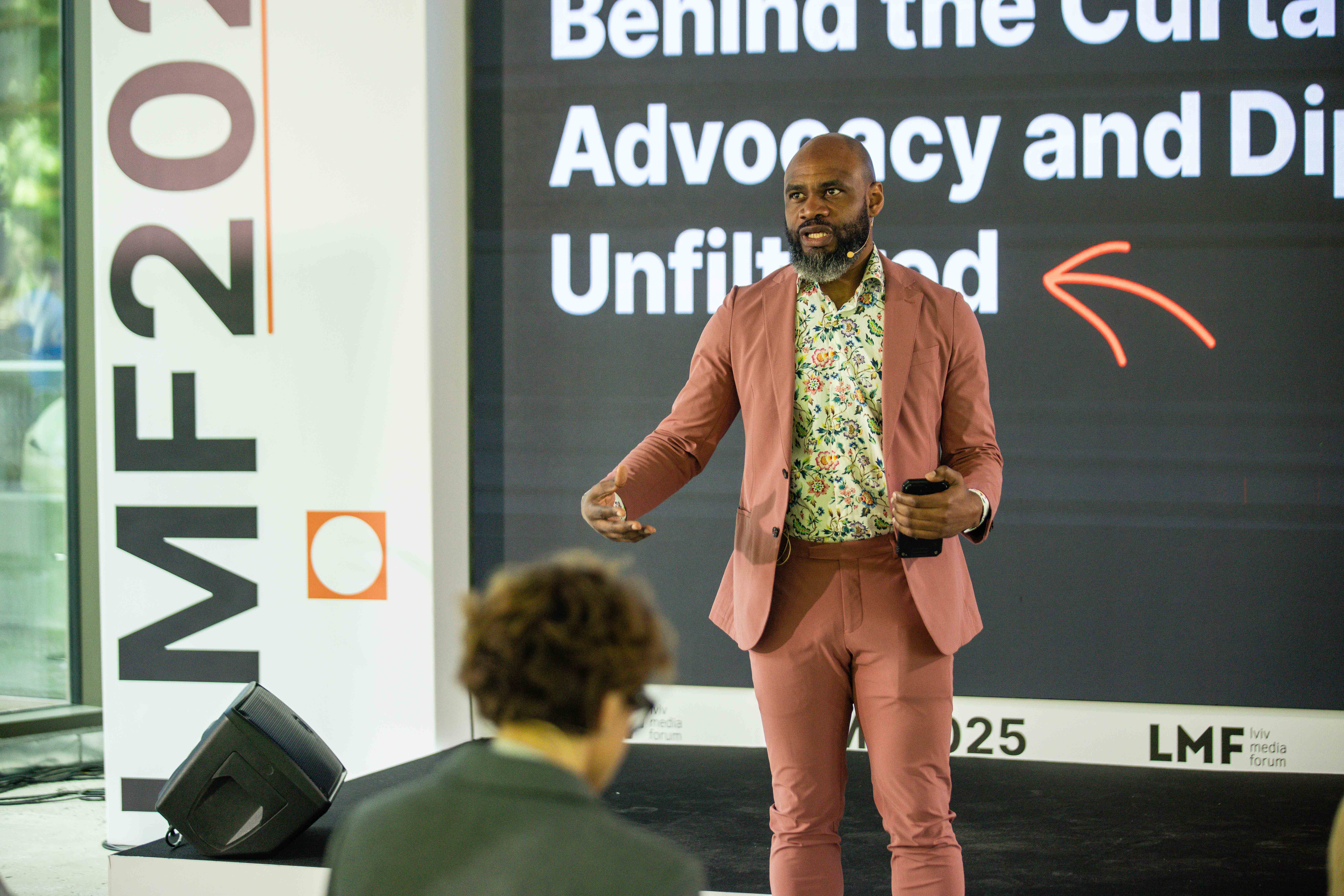The cameras loved the image: a Black reporter helping white Ukrainian families in the first days of the war, carrying suitcases through Kyiv's train stations as missiles fell. Social media dubbed him "Ukraine's Harriet Tubman" — a hero running his own Underground Railroad to safety.
Then Terrell Starr, an independent journalist who went viral for his war reporting as a Black American in Kyiv, started talking about the African students who couldn't board those same evacuation trains.
Suddenly, the same people who celebrated his humanity accused him of being a Kremlin propagandist.
"I'll just be very direct with you," Starr told a packed audience at Lviv's media forum this May. "For many people, I was a mascot."
What followed was the kind of speech that makes rooms go silent — an American journalist forcing both Ukrainian and international audiences to confront the uncomfortable intersections of race, war, and solidarity that most prefer to ignore.
"Western colonialism is not the only colonialism"
My perspective of being in America is quite frankly vastly different from many Americans who come and talk to you.
Because America is defined by race — and that's a true fact — my experience is vastly different, and quite frankly, it's rougher.
This Black Lives Matter activist once told me, "Terrell, given that when we are suffering in the world, whether it be in America or Africa, we don't get the same type of acknowledgment or care for our lives."
And not only that. When we saw African students who not only dealt with racism leaving Ukraine, but also when they entered the European Union and did not get the same reception, it was difficult for me to say that I support Ukraine. I know that I should. I feel bad for them. But the best way that I can support Ukraine is with my silence.
This is a key question. Most people, when they advocate for Ukraine, they speak to white audiences and people who don't look like me. I speak to the audiences who need to hear Ukraine's message. So I'm juggling both of these real serious issues: Russian colonialism in this part of the world, and white supremacist violence.
The other challenge I have is being not only a Black journalist but a Black human being who lives in Ukraine. I am surrounded by Americans who would fly across the Atlantic Ocean to support you in your fight against Russia, but will not drive 30 minutes to a Black Lives Matter protest to defend a fellow American who's been shot dead by police.
"When I started talking about my own people, I was a tool of Russia"
To be quite honest, many of the people — and these are the people who I'm working with and being collegial with — care more about your lives than they do my own. That is my reality. This is actually my first time talking about this in this form, and I'll come back to why it's so important that the event has invited me here.

People know me from covering the war in Ukraine. I was helping refugees who were coming from the Kyiv region to go to Western Europe. People saw me on television and they made a reference.
They were referring to a Black woman in American history — her name is Harriet Tubman. She ran the Underground Railroad and helped enslaved people flee from the South to the North. Black people were joking around, saying that I was bringing the Underground Railroad to Ukraine and helping people flee to Western Europe.
It was a point of endearment because they really valued my humanity — the fact that I valued their humanity. I come from a mostly Black community back home, and the fact that I have no personal connection to this part of the world, but my heart was so open that I would spend my time in Ukraine making sure that I told the truth about Russian imperialism and the brutality of this war and how it was impacting Ukrainians.
Most people didn't care about the politics of Ukraine. They didn't care about the politics of Russia. What they cared about was that they saw this Black man who was helping white people, and they wanted to understand why.
To be quite honest with you, I ask myself that often. But what I noticed in the media coverage of me was that people were fascinated by this Black guy who was helping Ukrainians leave their homes and go to safety. I helped maybe four or five different families at one time, and it was really publicized.
However, when I started talking about the African students that I met leaving Ukraine, and also those that I met in Germany and France, and was talking about the racism that they experienced, people on social media — and people with names, people who are well-known— accused me of being a Russian propagandist or a Kremlin stooge.
So I was praised for talking about the humanity of Ukrainians, but when I started talking about my own people, I was a tool of Russia.
I'll just be very direct with you: for many people, I was a mascot.
There was a saying here earlier today or yesterday that "you don't have to be Ukrainian to care about Ukraine — you just have to be human." And I agree with that. But I also ask: what about my humanity?
"The term 'white' does not accurately describe the type of experience that Ukrainians exist in"
Each day when I write my posts on social media, when I talk about Ukraine, I also spend a lot of time talking to Black people that yes, there is such a thing as whiteness, but the term "white" does not accurately describe the type of experience that Ukrainians exist in over here.
Thousands of Africans are stuck in Ukraine following Russia's invasion.
— DW News (@dwnews) March 2, 2022
But many of them face racist treatment and have been denied the right to cross the border to safety. pic.twitter.com/lRnPOcNmMh
So I spend a lot of time talking to my fellow Black Americans and Africans on the continent that what you're thinking about Ukraine and your view of them is actually very wrong. I spend a lot of time in intense conversations talking to my community — the ones who need to hear it the most — as well as people in the Arab community, the Middle Eastern community, South American community, that what you think about Ukraine is wrong.
Western colonialism is not the only colonialism that exists. And no, Ukrainians and Russians are not just a whole bunch of white people who are fighting each other. It's much more complex than that.
However, because I exist in this Black body, Ukraine is not the only subject or peoples that I'm compelled to care about.
When I talk about the African students who, for example, could not get work permits, who could not get visas to stay for the same periods as Ukrainians, again, I was considered as distracting from Ukraine. And these people not noticing that I myself am a Black person, and these are my people.So I just want to be real with you all. I want you all to really take time to understand people who are not white, to understand why people on the continent of Africa are so resistant to support Ukraine.

Not because they don't like Ukrainians, but because they too have a history of colonialism, and that colonialism was perpetrated and continues to be perpetrated by people who give you arms to fight your colonizers. All these structures have been created for us to hate each other, and I want us to have the intellectual dexterity to resist it and to divest from it.
"We all have to fight the colonizers together"
There are some things on the walls of this place that talk about having uncomfortable conversations. Just as I've had uncomfortable conversations telling my people that they're wrong, I think that it would be powerful for you to tell the Europeans in France and London and elsewhere that when Africa talks about their artifacts being stolen and their reparations, you should speak up for them too if you want them to speak up for you.
We all, in our fight against colonialism, we all have to fight the colonizers together. And that's really my message to you.
One more thing: I'll never forget — I've also been to Palestine. Another uncomfortable conversation, but this is an open mic. I've also been to Palestine.
Black Americans and Palestinians have a decades-long relationship with each other. When the Black Lives Matter movement started, it was the Palestinians who taught Black people how to wash tear gas from their eyes. So Black Americans have a far deeper and richer relationship with Palestine than they do with Ukraine.
As somebody who's gone to Palestine and has written about this, after I left the West Bank and was writing about the apartheid that they were experiencing, I lost in one day 30,000 followers on Twitter — 30,000. I lost thousands more on my Instagram accounts.
And the words and the language were very patronizing: "Well, Terrell, you're so smart about Ukraine. Why are you talking about this?"
Well, here's the reason. And I was telling some students at Temple University this:
If I don't advocate for oppressed peoples in Africa or oppressed peoples in the Middle East, and particularly Palestinians, I have no credibility — I have zero credibility to go to my community to talk about Ukraine.
So really, this is the first time I've talked to you all publicly in this way. For me to do the work that I do, I have to have a broad range of interest and knowledge so that when I talk to my community about oppression, I damn sure better be ready to talk about the oppression that we face, and also come into rooms like this and share with you so that we can be advocates for one another.
Because I'll give you another important point: I found Ukrainians to be far more open to these types of conversations than many people in America. Many of the think tanks that you all go to, where people fly across the Atlantic Ocean to see you — I would never be welcome in their rooms.
But you are. So I advise you that as I advocate for you, I need your support, because many of the white Europeans that wouldn't feel comfortable talking to me will definitely feel far more comfortable talking to you.
Just as I've had to live with my Blackness and understand my reality as a Black man in this world, I want you all to understand this important point:
You are dealing with Russian colonialism over here, and it's very much true. And whiteness does not speak to your experience — it's really a simplistic term to define who you are and your humanity. But when you step outside of this country and enter into Europe and the rest of the world, you are viewed as white like everyone else.
I think that's incumbent upon all of us to really push ourselves away from these racial constructs that are used to divide us. I'm really happy to be invited here to speak candidly with you all, because if there is no other forum where we can learn how to really embrace our commonality as human beings, it's this one. I'm really grateful for that opportunity.
Thousands of Africans are stuck in Ukraine following Russia's invasion.
— DW News (@dwnews) March 2, 2022
But many of them face racist treatment and have been denied the right to cross the border to safety. pic.twitter.com/lRnPOcNmMh

